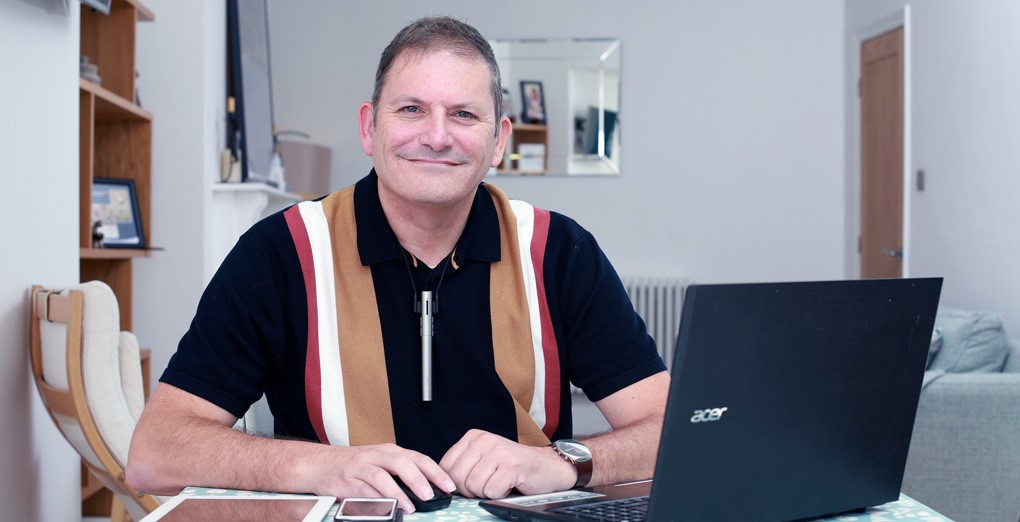Vickie works for Carers Trust Solihull, which supports unpaid adult and child carers to maintain their own wellbeing. She has severe hearing loss, and shares her story on how a workplace assessment by RNID ‘significantly changed her life.’
I have had hearing loss for my entire life and was formally diagnosed when I was aged four. Without my hearing aids, I can’t hear anything. Over the past 20 years, I’ve managed to use the phone with the help of phone amplifiers or Phonak devices. But in recent years, my hearing has deteriorated with age and this equipment no longer helps.
I started to experience a lot of anxiety around making and receiving phone calls. It wasn’t that I didn’t want to speak to people; I was worried that I wouldn’t hear them, that I’d get the details wrong or that I’d ask them to repeat things too many times and it would become awkward. For nearly two years, I barely used a phone at work. I managed to scrape by as most of my work was face-to-face (I worked as a travel trainer for young people with additional needs).
When I changed jobs in November 2020, we were in lockdown. Suddenly I found myself starting a new job at Carers Trust Solihull, working from home remotely. This meant that communicating with my colleagues and clients would need to be done differently.
My role centres around completing carers’ assessments and reviews. Normally, this would be face-to-face but the pandemic now meant phone calls only. Our carers are aged anywhere from five to ninety and we look at what support they need to maintain their own health and wellbeing and also to access appropriate support for them from various services. When I’m not doing assessments, I take calls from carers who are looking for emotional support or need specific information.
It was my employer who suggested I have an assessment with RNID to look at equipment that could help me do my job. To be really honest, I didn’t have any great expectations. Instead, it significantly changed my life. Even though it had to be done remotely, the assessor was great. She put me at ease straight away and had a good grasp of the main issues that were affecting me at work. She asked about equipment I already had and we discussed other options available for my specific needs.
The biggest game changer
Her recommendations included deaf awareness training for my team and changing my email signature to indicate my hearing loss and preferred methods of communication. I’m now using Microsoft (MS) Teams for video calls, which produces captions and makes following conversations in meetings so much easier. Whenever there’s a need to refer back to a meeting, I can do so through Otter, a live captioning platform, as it allows me to save the transcript. The biggest game-changer though is using MS Teams phoneline through my laptop. It produces very accurate captions from both the caller and the speaker. I use this along with my Phonak Roger Mylink and the two work very well together.
This has levelled the playing field for me and taken down the biggest barrier that I faced. I’m now able to make calls to other professionals and to the carers I support. I have made more calls in the past three months than I’ve made in the past five years. I enjoy calling our carers now – hearing their stories, offering them emotional support and practical solutions. I think that taking time to listen is so important in our busy world. Life as a carer can be very isolating, tiring and consuming. Being available and giving someone time is invaluable. It is deeply rewarding to be able to make a difference to someone’s day just by making a phone call.
I am so proud of what I’ve been able to achieve. I will be forever grateful that my employer chose the RNID work assessment.
Find out more
We offer a full range of work access solutions:
- Communication support
- Deaf awareness training
- British Sign Language (BSL) training
- Workplace assessments
Find out more about the support we offer to businesses and organisations
More like this
Contact us
We can help.
